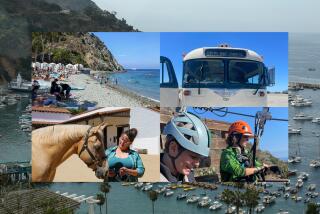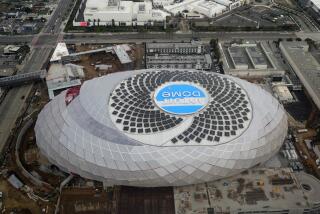MADD Wants to Dry Out the Harbor : Campaign Strives for Sober Boaters
- Share via
Picture a gorgeous day in Dana Point Harbor. The sky is blue, the sun is warm, and you’re gliding through the water in a powerboat, wheel in one hand, a beer in the other.
Take away the beer, says the Orange County chapter of Mothers Against Drunk Driving, and it’s a perfect picture.
Almost three years after MADD introduced its “designated-driver” program aimed at preventing drunk driving, the local chapter now is taking its campaign to a new front--the waterfront.
Never mind that, in seaman’s lore, sailors have a reputation for being as dry as Davey Jones’ locker. MADD is attempting to establish a designated-driver program in all of Dana Point Harbor’s restaurants and bars, as well as in the three yacht clubs.
Further, MADD members want the boaters to take the concept onto their vessels and make sure their skippers are sober. To that end, the Dana Point Harbor Assn. is printing special posters that will go up at the fuel dock, launching ramps and other places frequented by boaters, telling them that if they are at the helm, they should not drink.
It’s the first boating community in Orange County--and one of the first in the state--to be targeted by such a campaign, officials said. And if MADD is successful in Dana Point, Newport Beach will be next, they said.
The dangers of drinking at a busy marina can be twofold, according to Sherry Metcalfe, president of Orange County’s MADD chapter. Skippers who stop in a bar for a drink before hitting the seas--or who imbibe on their vessels--are hindering their judgment and increasing their chances of having an accident, Metcalfe said.
And second, unless the boaters plan to spend the night on the water, all aboard--not just the skipper--still face a drive home. That’s something that should be kept in mind while drinking on the boat, as well as later on land, when friends gather in bars and restaurants after a day afloat, Metcalfe said.
“The idea doesn’t stop at the dock. It’s until everyone gets home,” she said.
MADD officials say their attempt to reach boaters is a natural extension of their “designated driver” program. Under that program, when a party of three or more orders at a participating restaurant or bar, one person is appointed the designated driver and is entitled to free nonalcoholic drinks. In exchange, that person pledges to drive all the others home.
Metcalfe said MADD approached the Dana Point Harbor Assn. about having its restaurants and bars join the designated-driver program, and the idea of stressing boating safety took off from there.
“Most boaters are responsible. But if we can save just a couple of people, we’ve done our job,” said Jody Tyson, president of the harbor association.
Unlike driving, it is not against the law to have open containers of alcohol on a boat or even to drink while at the helm. It is, however, against the law to be intoxicated with a blood alcohol level of .10 or more while operating a boat.
“So if you go from drink to drunk, yes, that’s against the law,” said Capt. Harry Gage of the Orange County Sheriff Department’s Harbor Patrol.
Commodores of Dana Point’s three yacht clubs, with a total membership of about 800, all said they support boating safety, but they had mixed reactions to adopting MADD’s “designated-driver” program in their own private restaurants and bars.
John Watts of Dana Point Yacht Club said his board of directors has agreed to participate, but he is not sure how it will be applied inside his clubhouse. “We’ve got a unique situation. Our people mostly come in as singles or couples. It’s not like a public restaurant, with big parties,” he said.
“I know there is a lot of drinking aboard boats,” he said, but he added that he believes that boaters do not drink any more than other groups. “It’s just prevalent in society,” he said. Still, he is eager to see what the club can do, he added. “I’m a grandfather of eight, and I think about these things.”
Dana West Yacht Club will not join up, although the club will put up posters and hand out information about sobriety aboard boats, commodore Craig Rahn said.
‘A Lot More Control
As a private club, there already is “a lot more control” over drinkers, Rahn said. The bartenders know the members and know how much they can drink. If someone is not in shape to get aboard a boat or drive home, the bartender or friends in the club make sure that that person does not go on the road or water, Rahn explained.
The yacht club already offers soft drinks for 50 cents and coffee for a quarter--and it’s free to people who need to sober up--so there is no pressure to drink alcohol, he said.
“People come here because they’re interested in boating,” he said. “We use the clubhouse to socialize and talk and to bring our friends.” When people come in the door, they are stopped and screened to make sure they are members. Further questioning about who is the group’s designated driver might “make them feel inhibited,” he said. “We don’t want it to be another stop when they come in the door.”
The smallest club, Capistrano Bay Yacht Club, which is open only on weekends, is looking at the designated-driver program, according to commodore Wolfgang Schimanski. He is not sure of the logistics of implementing the program in his club, which is family-oriented and stocks a lot of alcohol-free drinks already. Like Dana West Yacht Club, members will take a person home if someone has drunk too much, he said. Still, he added, one member was arrested recently for drunk driving, “and it opened our eyes.”.
According to the Harbor Patrol, there is not a major problem of boozing and boating at Dana Point, or at Newport or Huntington harbors. Last year, there were only seven arrests at the three harbors for operating a boat while intoxicated, Capt. Gage said. However, he added, such arrests usually are made only when there has been an accident or “wildly erratic” behavior.
“Boating takes place in such a beautiful environment. You want to enjoy the water, and there is a certain degree of hazard and risk. Why would anyone want to be intoxicated on a boat?” Gage wondered. “I would think that they would want to have full control and be able to save the boat and themselves.”
Still, it is hard to forget one infamous boating and boozing accident in Orange County. In 1984, five people were killed late one night when a boat piloted by Virl Earles ran into an unlighted buoy in Anaheim Bay off Seal Beach. Earles and three others survived. Earles was found to be intoxicated and was convicted of involuntary manslaughter. He has appealed his conviction.
That accident led to a state law establishing a blood-alcohol percentage level to determine if a boat operator is intoxicated. Several people also pointed out that the recent Alaskan oil spill occurred after an allegedly drunken skipper left an unqualified seaman to pilot the Exxon tanker Valdez.
Metcalfe said that drinking can be dangerous on the water even when the boater is not at the controls. An intoxicated person who falls into the water is disoriented, may not be able to tell which way is up and is more likely to drown, she cautioned.
David Johnson, legislative coordinator with the state Department of Boating and Waterways, agreed. A study by his department determined that 59% of all boating fatalities are alcohol-related. In addition, he said, there is a “synergistic effect” with the wind, sun and waves that makes the body slower to react, even without alcohol.
While many in the boating community in Dana Point Harbor acknowledged that boaters have a reputation for enjoying the bottle, they all argued that the stereotype is undeserved. Boaters don’t drink any more than anyone else, they contend. Check out the ballpark on a hot Sunday afternoon, several suggested.
“It doesn’t matter if they go to the air show, the stock car races or the Angels game. If it’s a hot day and it’s outdoors, you find people with coolers of beer,” Dana West Yacht Club’s Rahn said.
According to MADD officials, Orange County has the largest “designated-driver” program in the country, with more than 90 restaurants participating. Metcalfe expects the boating community of Dana Point to embrace the program just as easily.
“Ten years ago, the whole public attitude toward drinking was different. Things are changing. Society views drinking differently today, and boaters are members of society,” she said.
She disputed the idea that having a designated-driver program at a yacht club would be inhibiting to members. Restaurants that have joined have found a variety of non-offensive ways to introduce the idea to customers, and they promote good will with the patrons, she said. A pro-active approach is necessary to combat the problem, she said, cautioning that pouring coffee into someone who is drunk does not make him a sober driver.
If an establishment is just posting flyers encouraging people not to drink and drive, “how poorly that will look in case someone has an accident after leaving there,” Metcalfe said, adding that 50% of all people arrested for drunk driving had imbibed at restaurants and bars.
MADD Training Program
MADD’s program includes training the restaurant employees and gives publicity to member establishments, she said.
The Dana Point Resort, which overlooks the harbor, already is a member, as is Reuben’s in the harbor. The hotel not only gives free, non-alcoholic drinks to the designated driver, it also gives reduced room rates to guests attending special events, such as wedding receptions or banquets, in case they drink too much while at the hotel.
Metcalfe, whose parents were killed five years ago by a drunk driver leaving a wedding reception at a restaurant, is a boater herself. Her family recently acquired a fishing boat, which is docked in Newport Harbor.
“Our rule is we always have a sober skipper,” she said. “So far, there hasn’t been an ounce of alcohol on the boat.”
More to Read
Sign up for Essential California
The most important California stories and recommendations in your inbox every morning.
You may occasionally receive promotional content from the Los Angeles Times.













